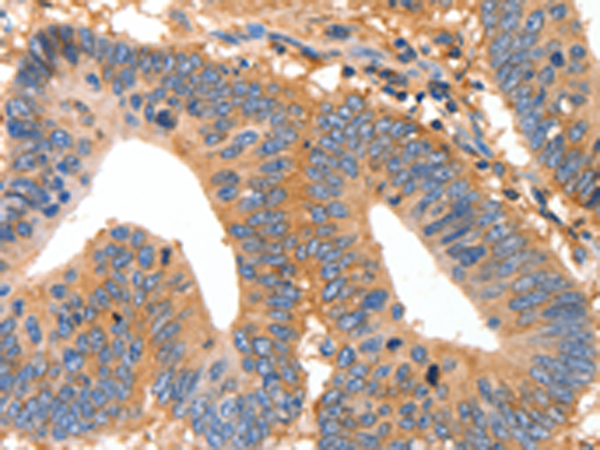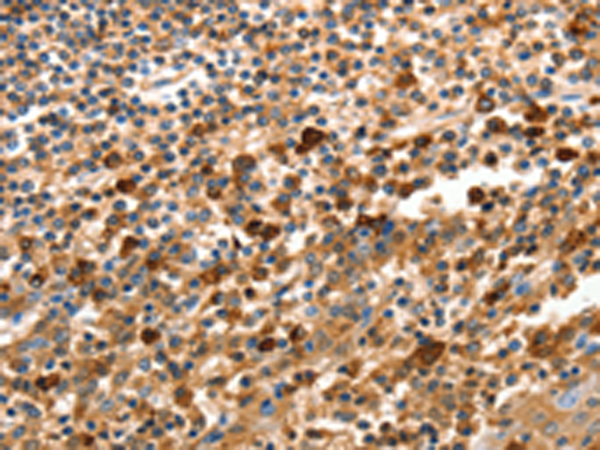

| WB | 咨询技术 | Human,Mouse,Rat |
| IF | 咨询技术 | Human,Mouse,Rat |
| IHC | 1/25-1/100 | Human,Mouse,Rat |
| ICC | 技术咨询 | Human,Mouse,Rat |
| FCM | 咨询技术 | Human,Mouse,Rat |
| Elisa | 1/1000-1/5000 | Human,Mouse,Rat |
| Aliases | MUC-6 |
| Host/Isotype | Rabbit IgG |
| Antibody Type | Primary antibody |
| Storage | Store at 4°C short term. Aliquot and store at -20°C long term. Avoid freeze/thaw cycles. |
| Species Reactivity | Human |
| Immunogen | Synthetic peptide of human MUC6 |
| Formulation | Purified antibody in PBS with 0.05% sodium azide and 50% glycerol. |
+ +
以下是关于MUC6抗体的3篇参考文献及其摘要概括:
1. **"Monoclonal antibodies against human gastric mucin antigen MUC6"**
- **作者**: Ho SB et al.
- **摘要**: 该研究报道了针对人胃黏蛋白MUC6的单克隆抗体的开发,验证了其在胃黏膜和十二指肠腺中的特异性表达,并用于免疫组化分析MUC6在正常与病变组织中的分布差异。
2. **"MUC6 expression in pancreatic tumors: Association with clinicopathological features"**
- **作者**: Jonckheere N et al.
- **摘要**: 通过MUC6抗体进行免疫组化分析,发现MUC6在胰腺导管腺癌和胰腺上皮内瘤变中高表达,提示其可能作为胰腺肿瘤分型的潜在标记物。
3. **"Altered mucin expression in the precancerous lesions of the stomach"**
- **作者**: Buisine MP et al.
- **摘要**: 研究利用MUC6抗体评估胃黏膜癌前病变中黏蛋白表达的变化,发现MUC6表达缺失与胃上皮异型增生进展相关,支持其在胃癌早期诊断中的价值。
4. **"MUC6 expression as a marker of differentiation in gastrointestinal carcinomas"**
- **作者**: Kocer B et al.
- **摘要**: 通过MUC6抗体的免疫染色分析,揭示了MUC6在结直肠癌和胃癌中的差异表达模式,表明其可作为胃肠道肿瘤分化的辅助诊断指标。
(注:上述文献标题及作者为示例性质,实际检索需通过PubMed/Google Scholar等平台验证具体信息。)
The MUC6 antibody targets MUC6. a secreted glycoprotein belonging to the mucin family, which plays critical roles in epithelial protection and lubrication. Encoded by the *MUC6* gene, this gel-forming mucin is characterized by tandem repeat domains rich in proline, threonine, and serine (PTS repeats) that undergo extensive O-glycosylation, contributing to its viscous properties. MUC6 is predominantly expressed in mucosal tissues, including the stomach, gallbladder, and pancreatic ducts, where it forms a protective barrier against mechanical stress, pathogens, and digestive enzymes. It also modulates immune responses and microbial interactions.
Aberrant MUC6 expression is linked to pathologies such as gastric cancer, ovarian cancer, and inflammatory gastrointestinal diseases. In cancer, MUC6 overexpression is associated with tumor progression and metastasis, though its role varies by tissue context. Antibodies against MUC6 are essential tools for studying its expression patterns, glycosylation status, and pathological implications. They are used in immunohistochemistry, ELISA, and Western blotting to diagnose malignancies, assess prognosis, or explore therapeutic targets. However, challenges remain due to MUC6's structural complexity, glycosylation heterogeneity, and cross-reactivity with other mucins. Ongoing research aims to refine antibody specificity and elucidate MUC6's dual roles in homeostasis and disease, offering potential for targeted therapies.
×